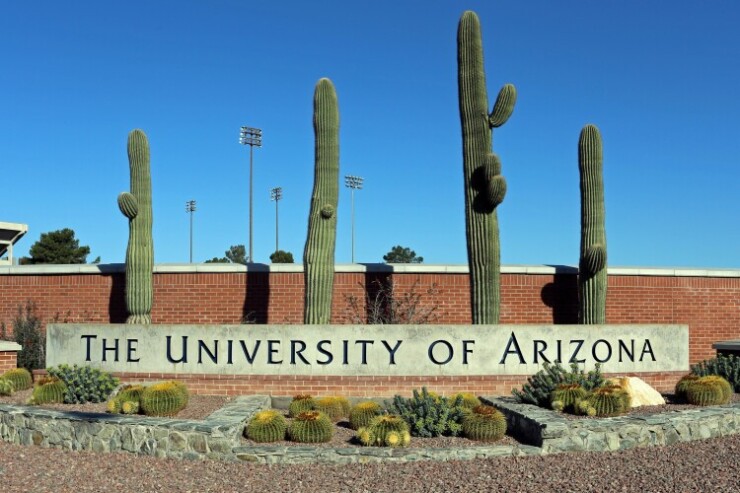The University of Arizona heads to the municipal bond market this week with its first bond issue since financial troubles led to negative rating outlooks from Moody's Ratings and S&P Global Ratings.
The $115.645 million of Stimulus Plan for Economic and Educational Development, or SPEED, revenue bonds issued through the Arizona Board of Regents will refund debt the Tucson-based university issued in 2013 and 2014.
Rating outlooks

The deal would get a credit boost from insurance.
"Our financial advisor identified a financial benefit of having the bonds carry insurance from Build America Mutual with their AA rating," university spokesman Mitch Zak said in an email, referring to the insurer's S&P rating.
In fiscal 2023, the
Last December, Fred DuVal, who was the regents' chair at that time, called the decline a symptom of the university's ongoing budget deficit and a decentralized financial and reporting structure that did not flag the situation sooner.
"The U of A has made significant progress on its finances, including reducing the FY 2024 budget deficit from over $177 million to approximately $63 million in six months," Zak said. "In the coming years, university leaders will continue to invest in academics and impact-driven research while laying the foundation for a balanced budget and sustained financial stability."
The university
A $65 million deficit is projected in the fiscal 2025 unrestricted funds operating budget, which includes nearly $1.3 billion in allocated funds.
The university ended fiscal 2024 on June 30 with $641 million in cash reserves, which is projected to fall to $576 million when fiscal 2025 ends, according to Zak.
There has been a flurry of governance changes over the past year.
The university's chief financial officer resigned and was replaced by Board of Regents Executive Director John Arnold.
University President Robert Robbins, whose salary was cut by the board in March, remained in office until Suresh Garimella assumed the presidency last week. Cecilia Mata now chairs the regents board.
In a September rating report, Moody's said a "prolonged period of governance instability," and other factors such as deteriorating financial reserves and sustained weak and volatile operating performance, could result in a rating downgrade.
The report added the Aa2 issuer rating incorporates the university's "excellent brand," solid student growth, and broad geographic appeal.
S&P's rating report noted the university's "very strong enterprise risk profile and strong financial risk profile, with stable demand and a strong research presence," but said it was offset by weak operations and balance sheet metrics, as well as a high debt service burden, although a significant amount of principal is amortizing in the near term.
"The negative outlook reflects our expectation that, during the outlook period, U of A will experience near-term pressured operations and weaker balance sheet metrics, which could result in a lower rating," S&P analyst Laura Macdonald said in a statement.

The university's negative outlook bucks a trend S&P identified in a September report, which said 90% of public universities currently have a stable outlook, "overall weathering the pandemic more favorably than (private colleges and universities) given the benefit of state support."
Arizona's Democratic Gov. Katie Hobbs has pressured the university to fix its finances, while calling for "proper oversight and accountability" by the regents. In August,
Hobbs has also questioned
Ashford University had a troubled history before it was acquired by the university in June 2023. The state of California successfully sued the school over misrepresentations it made to student loan borrowers, which led the U.S. Department of Education to approve
The preliminary official statement for the refunding said the federal agency has not yet sent the university or its global campus entity "a requisite recoupment notice."
Continued integration risk associated with University of Arizona Global Campus would further narrow the university's already thin liquidity, Moody's said.
The university has $935 million of outstanding debt secured by a first lien on its system revenue, according to the POS. Following the refunding, outstanding subordinate SPEED debt will total nearly $272 million.
Its
The university's
The university, which was established in 1885 as Arizona's only land grant institution, enrolled more than 53,000 students last fall.
Revenue has increased 55% over the last five years, driven in part by non-resident tuition, as out-of-state students increased from 41.5% of total headcount in fall 2019 to 51.2% in fall 2023, according to an investor presentation for the refunding issue. State funding accounted for 17% to 19% of the university's unrestricted current operating funds in fiscal 2019 through 2023.
Debt service on SPEED bonds is paid with certain state lottery and university revenue and secured by a subordinate pledge of gross university revenue.
The refunding, scheduled to price on Wednesday, is structured with serial maturities from 2025 through 2044, according to the POS.
"SPEED Bonds are serviced 80% by Arizona State Lottery funds and 20% by the university, so most savings accrue to the lottery funds," Zak said. "Current estimates, subject to pricing, are $16M (net present value) savings."
Morgan Stanley leads the underwriting team of BofA Securities, Goldman Sachs, and JP Morgan. The bond counsel is Squire Patton Boggs and the financial advisor is RBC Capital Markets.





